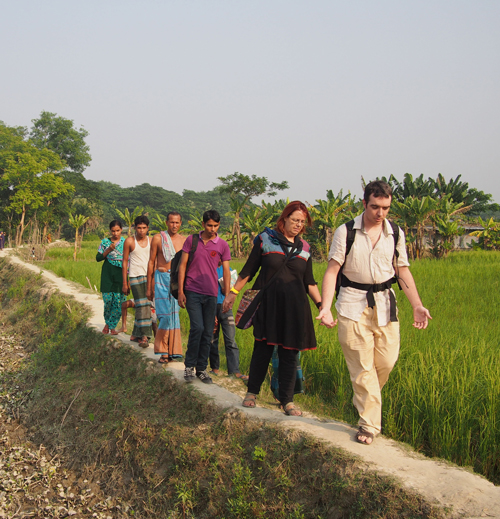“Having a head for business can make you a better humanitarian aid worker”
Régis Dantin is an agricultural development specialist who has always sought to put his technical expertise to good use in humanitarian aid work. He recently set up his own business in France: not because he wanted to change careers, but to make him more effective in the field.
It’s possible to have a career in humanitarian aid . . .
To my mind, working in humanitarian aid is a career just like any other: you learn new skills and become better at it over time. At times, it’s a very complicated field to work in. It’s not enough just to want to help people. I would agree that being motivated is essential, especially when you’re starting out. But you also need to know what is going to make you stand out: you need to develop some kind of technical expertise. Being able to respond to humanitarian needs requires sound knowledge and solid, practical skills. For me, it’s also a question of respect, particularly with regard to the national teams. We owe it to them to be competent and professional, especially when we’re meant to be training a team and building their capacities.
. . . as long as you have something to offer in technical terms
I knew quite early on that I wanted to study agricultural and rural development, with a view to applying these principles in international aid work. With this in mind, I studied agronomy, then did a Master’s degree at the Institut de Formation et d’Appui aux initiatives de Développement (IFAID) in Bordeaux. When I left university, I travelled to Haiti, where I worked with a local organisation on the development of the agricultural sector. This first experience led me to work in a lot of different countries and contexts over the next six years, including the DRC, various countries in West Africa, and Bangladesh. Each time, my job was to develop, implement and evaluate emergency and economic recovery projects. I had a range of different positions, from project manager to technical advisor to trainer and programme coordinator, but I stayed in the field of food security and economic recovery.
“Humanitarian aid workers are first and foremost project managers”
Today, humanitarian aid workers are first and foremost managers, of both people and projects. The position of programme coordinator, which was my job in Bangladesh, is a perfect example of this trend: there’s a practical part to it – project supervision, which requires direct technical support – and a more institutional aspect, which involves networking, fundraising, and the development of an operational strategy.
Humanitarian workers often find themselves implementing income-generating activities, without necessarily having any business experience. This is one of the reasons I decided to set up my own business: a microbrewery. Over the course of three years – and in between short humanitarian missions – I learnt how to brew craft beers, then drew up and launched the project in Aveyron, which is the part of France I come from. My experience of humanitarian work actually came in useful: carrying out market surveys, working out what material was needed and finding funding were all things I had done during my missions. But on top of that, you find yourself having to produce, sell and manage the structure you’ve set up, all independently. There are personal risks you have to be willing to take. For me, this only enriches the work you then go on to do in the field. This experience enabled me to see first-hand what it’s like for the small business-owners we often work with: as a result, I’m able to better understand their motivations and the constraints they face.
A real sense of Solidarités !
Bangladesh
Context and action- 165.65 million inhabitants
- 129th out of 191 countries on the Human Development Index
- 29.780 people helped


